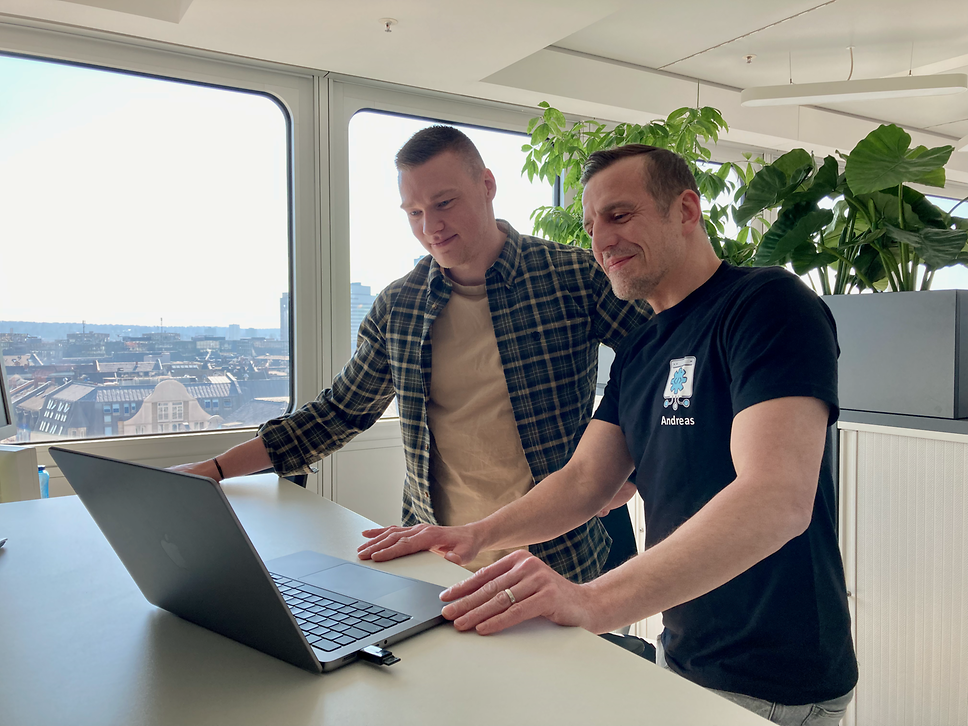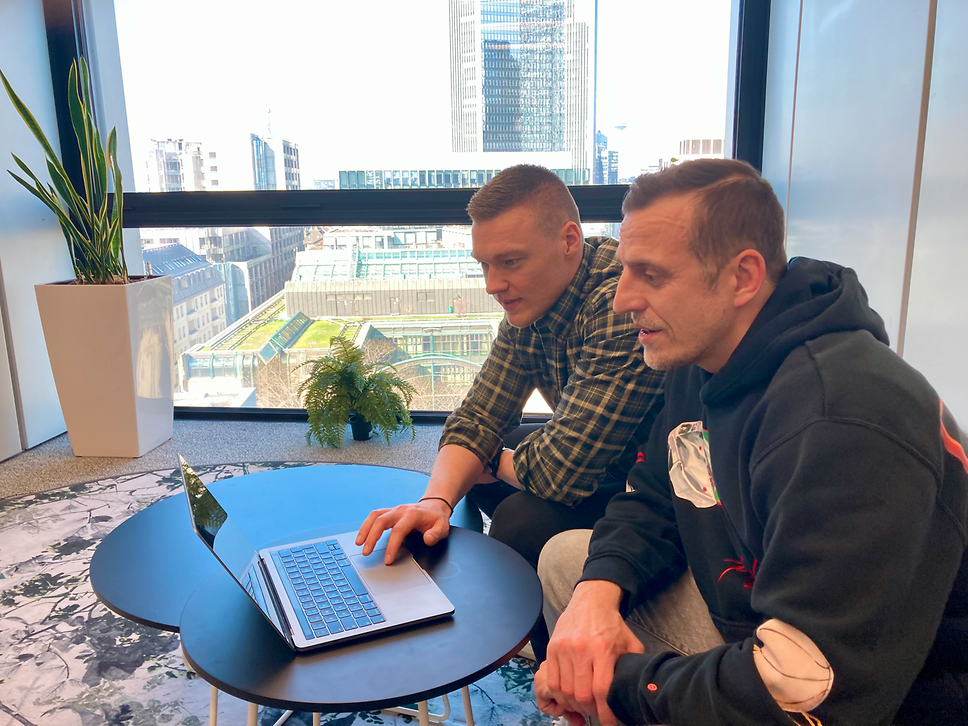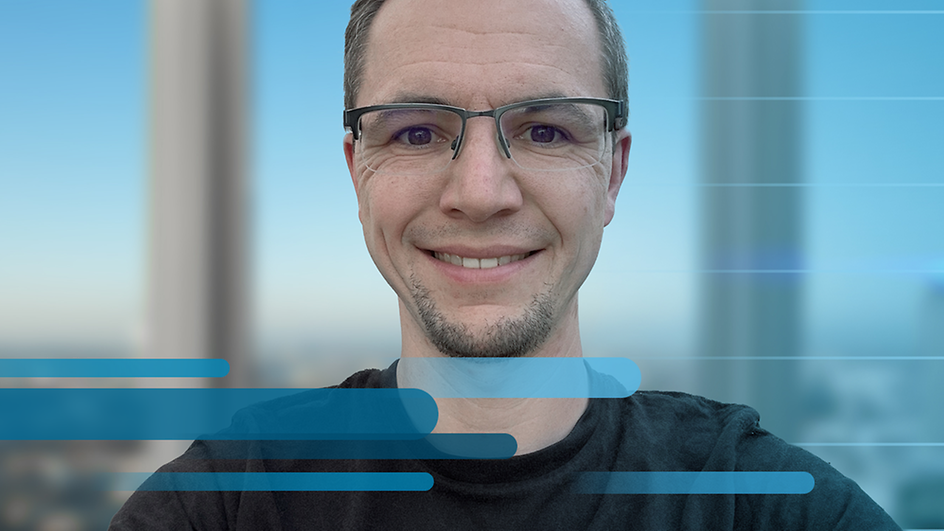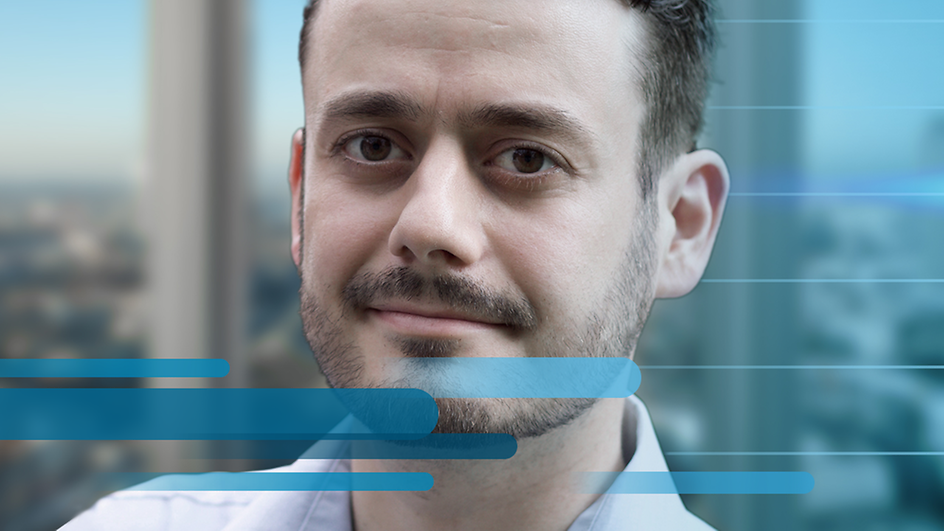Article: The app store for APIs: a look at the working world of a DevOps team
Working closely together to manage the entire life cycle of an application: how our software developers develop and run solutions together in the DevOps production model, organising themselves and learning all the time. Today we meet Henrik Scholl and Andreas Beresko.
Henrik and Andreas are DevOps engineers in the "Digital Platforms" cluster, the home of central technological platforms that form a unified basis for innovative solutions by Deutsche Bahn. Andreas joined DB Systel in 2016 and has been in his current role for four years. Before that, the computer scientist had already worked as a developer, consultant and system architect. Henrik is a home-grown product of DB Systel who embarked on a cooperative education programme at DB Systel back in 2014. He speaks highly of his time as a student on this programme, when he learned a lot and became familiar with a variety of different in-house positions. He went on to work as a full-stack developer and has been based in the "Digital Platforms" cluster as a DevOps Engineer since 2020.
The "techie" in Henrik is particularly enthusiastic about the modern technology stack used by the team. Andreas takes pride in managing his own product with the team and developing it further over the long term. Both are delighted that the DevOps production model is part of the corporate culture at DB Systel and is consistently put into practice.
Developing the app store for DB interfaces
Their team is responsible for Deutsche Bahn's central API platform. This platform can be thought of as an app store for data and functions. @Deutsche Bahn and DB Systel use this central API ecosystem to actively promote the availability of useful services throughout the DB Group while ensuring that the same functions and data services are not developed more than once. For example, the API platform is currently being used for the data connection of the passenger information system, which includes departure times, station information and the search for connections. Train passengers can also hold the results in their hands, with well-known apps such as the BahnBonus app using the services of the API platform.
Henrik and Andreas are a well-coordinated team, even in conversation. And the DevOps engineers are already a close-knit community. After all, the team is jointly responsible for the complete life cycle of its product: team members listen and respond to the needs of customers, develop new functions themselves, ensure that solutions operate reliably, and provide product support. As they say themselves, "You build it, you run it". That's a lot of responsibility.
"Whether you are new to the team or have 20 years of experience, we all work as equals here."
A non-stop enthusiasm for innovation
It is precisely this passion and sense of individual responsibility for the product that inspires the two. DevOps engineers are true universal specialists. Because the team members take turns providing support and being on-call for emergencies, everyone needs to be able to perform virtually every task. For this to work, everyone in the team needs to know as many details about the product as possible. That is why the DevOps engineers almost always program in pairs, for example, and always make sure that individual team members share their knowledge with the rest of the team.
"You need the passion to run what you develop yourself and follow it throughout the entire cycle."
This calls for a willingness to learn and change as well as excellent comprehension skills. Because the demands on the product keep changing, the technology has to keep changing too. Just like the product itself. The team performs more than 100 deployments a day, because agile software development in a DevOps environment depends on continuous refinement. You need to keep up and stay curious. This is Henrik's favourite aspect: getting used to new tools and languages again and again. "What we do is state of the art," says Andreas.
Collaborating from afar
Although the DevOps team for Deutsche Bahn's API platform works very closely together to ensure that the platform runs reliably at all times, it is geographically distributed throughout Germany. Team members agree that the remote working arrangement and flexible time management work really well. As is customary at DB Systel, the team organises itself as much as possible on a day-to-day basis. The team members support each other wherever possible and make joint decisions on issues such as who will be responsible for which tasks, who will be on-call for operations, or which candidate is a perfect fit for the team.
Absorbing knowledge and passing it on
Andreas admits that newcomers to the team might find the scope and range of tasks overwhelming at first. But new team members are introduced to the tasks gradually and systematically: "We give newcomers time and don't put them under pressure," he adds. Nobody is expected to be able to do everything. Because even experienced team members learn something new from their colleagues every day. Andreas particularly values the opportunities for continuous growth and development provided by DB Systel. These include further training or certification, which team members can pursue based on their own interests in consultation with the team. The basic requirement for applicants – besides a background as a software developer – is specialised knowledge of cloud technology such as Kubernetes and, ideally, cloud architecture.
Henrik, who was once one of the talented young professionals promoted by DB Systel, is now a specialist mentor for newcomers and students on cooperative education programmes. Newcomers are introduced to the basics during their first few days at the company and then receive an orientation plan including manageable tasks and achievements to help them gradually gain an overview. Continuous knowledge transfer is important to Andreas and Henrik, and not only within their own DevOps team: they also provide joint training to their Group colleagues, and by doing so, disseminate their own knowledge throughout the Group.
Would you like to work in a DevOps team at DB Systel just like Henrik and Andreas? Or even in the same team as them? With more than 101 established DevOps teams, we have a great selection to choose from. You can find job vacancies here.




